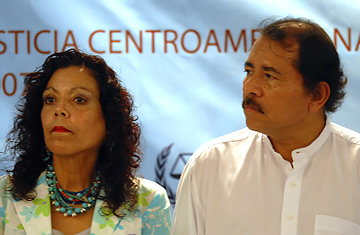
Nicaraguan President Daniel Ortega and first lady Rosario Murillo
When the U.S. media refers to "government sources," they could be talking about any one of hundreds of officials who routinely offer the press nuggets of information on condition of anonymity. But in the Nicaraguan media, "government sources" is really just a code name for Rosario Murillo, wife of President Daniel Ortega and head of all government communication — which may be something of a euphemism. Rather than make itself available to the media, the Sandinista government prefers simply to broadcast information through a handful of official news outlets, leaving the independent media to rely on unverified rumor, questionable sources, secondary reporting and the standard disclaimer: "Government sources did not return requests for comment by press time." Indeed, "government sources" pretty much ignores the news-gathering efforts of those outside the official media.
Murillo is arguably the most powerful person in the country and the most astute person in government. Viewed as a combination of Eva Peron, Yoko Ono and Tituba (she's often portrayed as a witch in editorial cartoons), Murillo has institutionalized her authority as head of the newly created Council of Communication and Citizenry, a post that essentially puts her second on the government's totem pole. And "government source" is a role she jealously guards, which is why Administration officials who have made the mistake of speaking to the press without Murillo's permission would, these days, be properly referred to as "former minister."
Back in the 1980s, after it had seized power in an insurrection against the Somoza dictatorship, the Sandinista Front policed the media with a heavy hand, strictly censoring and temporarily shutting down the leading daily La Prensa. Today, as a democratically elected govenrment, the Sandinistas have learned a more subtle approach: Simply starving the independent media of information and of government advertising, which has resulted in some radio programs having to shut down and some newspapers downsizing their staff.
"Journalism is different now," laments a colleague who covers politics for La Prensa. "With the previous government, we knew how to locate government spokesmen, but now it's all in the hands of the First Lady, and she is impossible to locate. When you call her press office, they always say they'll call you back in five minutes, but they never do."
Journalists have also found it difficult to keep tabs on President Ortega, whose whereabouts and scheduling are often kept as secretive as they would have been when he was a clandestine revolutionary moving from one safehouse to another. Reporters oftentimes have to monitor the official news outlets to find out where Ortega is, and what he's up to, or even if he's still in the country — he's been known to disappear for days on end without explanation.
But Murillo's office maintains a facade of friendly cooperation with the media — as my La Prensa colleague noted, they promise to call back in five minutes even when there's no reason to believe they will. They even call reporters to announce press conferences, but usually only as the event is already starting, which usually means late in the afternoon or evening. Some of Ortega's press conferences have been known to go later than 10 p.m., assuring that they won't be covered in the morning edition of papers.
"The situation is horrible; it's very complex," said Roberto Collado, the newsroom chief of the daily El Nuevo Diario, which recently led with a front page headline "Journalists Humiliated" after a press event to which only the official media was admitted, while other journalists had to stand outdoors in the rain and follow the proceedings on Sandinista radio. "[The government] sees us as enemies, as if we had a knife hidden in our notebooks."
For this story, I decided to ask Murillo about the souring relationship between her government and the independent media. I called her office to request an interview, and was politely told that my request would be passed along, and that my phone call would be returned as soon as they had an answer.
You could call it going through the motions, since I have requested numerous interviews with her over the past years, and the closest I got was an e-mail from her, back in February, that read: "Dear Tim, thanks for your interest. I will be giving interviews once we finish our phase of organization and planification."
Two days after my latest call, my phone rang. It was Murillo's office: "We're calling to let you know that Comandante Ortega is giving a press conference at 5 p.m. in Chinandega." This was at 4.30 p.m., and Chinandega is three hours north by car.
"OK, thanks. How's my request for an interview with Companera Murillo coming along?"
"We'll let you know as soon as we have an answer."
"Great, I'll look forward to the call."
But I won't hold my breath.
